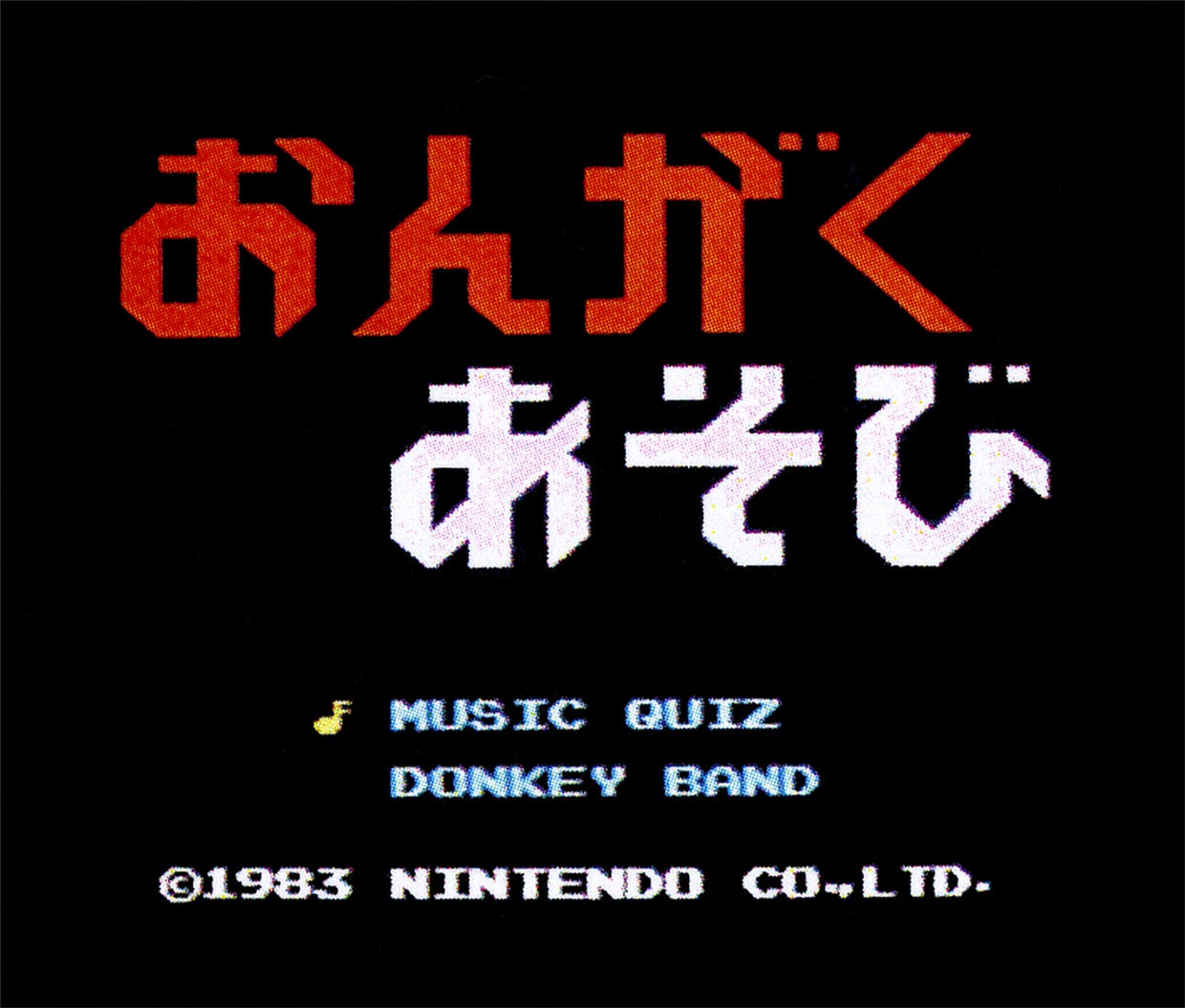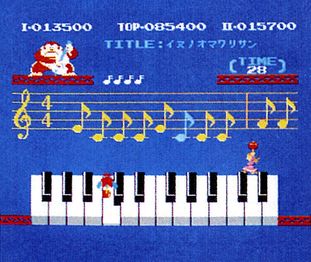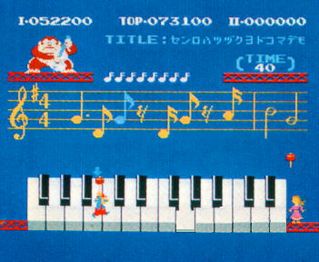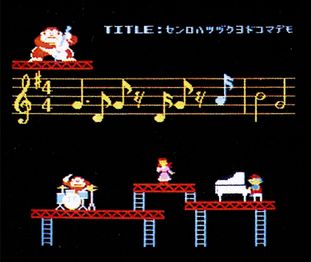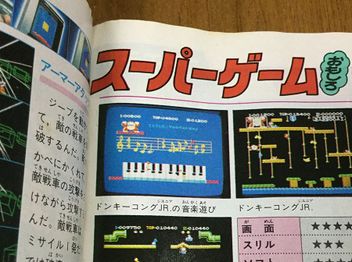Donkey Kong no Ongaku Asobi (lost build of cancelled Famicom educational game; 1983): Difference between revisions
Happy Brian (talk | contribs) (Added a "See Also" subsection.) |
m (→See Also) |
||
| (5 intermediate revisions by 5 users not shown) | |||
| Line 2: | Line 2: | ||
|title=<center>Donkey Kong no Ongaku Asobi</center> | |title=<center>Donkey Kong no Ongaku Asobi</center> | ||
|image=Donkey_Kong_Fun_With_Music_01.jpg | |image=Donkey_Kong_Fun_With_Music_01.jpg | ||
|imagecaption= | |imagecaption=The game's title screen. | ||
|status=<span style="color:red;">'''Lost'''</span> | |status=<span style="color:red;">'''Lost'''</span> | ||
}} | }} | ||
'''''Donkey Kong no Ongaku Asobi''''' (ドンキーコングの音楽あそび ''Donkey Kong’s Fun With Music'') is a | '''''Donkey Kong no Ongaku Asobi''''' (ドンキーコングの音楽あそび ''Donkey Kong’s Fun With Music'') is a canceled 1983 Famicom educational video game that starred the cast of the original Donkey Kong series with the newcomer Donkey Kong Jr. meant to teach players music.<ref>[http://www.unseen64.net/2008/04/14/donkey-kongs-fun-with-music-nes-cancelled/ Unseen64 article on ''Donkey Kong no Ongaku Asobi''.] Retrieved 29 Jul '17</ref> | ||
It was originally going to be released for the Famicom in December 1983 for the price of 3,800 yen, but Nintendo cancelled this game for unknown reasons and only released two educational titles instead: ''Donkey Kong Jr. Math'', and ''Popeye no Eigo Asobi''. ''Donkey Kong no Ongaku Asobi'' had only been announced in 1983 in a Japanese gaming magazine. | It was originally going to be released for the Famicom in December 1983 for the price of 3,800 yen, but Nintendo cancelled this game for unknown reasons and only released two educational titles instead: ''Donkey Kong Jr. Math'', and ''Popeye no Eigo Asobi''. ''Donkey Kong no Ongaku Asobi'' had only been announced in 1983 in a Japanese gaming magazine. | ||
| Line 11: | Line 11: | ||
No prototypes or any other information has surfaced aside from some screenshots. The game was seemingly cancelled for a variety of reasons: the licensing issues of the songs, only using children's songs, the small capacity of the Famicom, and the fact that the microphone couldn't analyze sounds. | No prototypes or any other information has surfaced aside from some screenshots. The game was seemingly cancelled for a variety of reasons: the licensing issues of the songs, only using children's songs, the small capacity of the Famicom, and the fact that the microphone couldn't analyze sounds. | ||
On May 19th, 2017, a Japanese Twitter user DentoTeramachi found a fifth screenshot in | On January 17th, 2013, a user commented on an article about the game claiming that they owned the game on a 4-in-1 bootleg cartridge. However, they stated they lost the cartridge a long time ago.<ref>https://www.unseen64.net/2008/04/14/donkey-kongs-fun-with-music-nes-cancelled/</ref> | ||
On May 19th, 2017, a Japanese Twitter user DentoTeramachi found a fifth screenshot in a gaming magazine.<ref>[https://twitter.com/DentoTeramachi/status/865593708497969154 Japanese Twitter user post on various screenshots of the game.] Retrieved 29 Jul '17</ref> | |||
==Gallery== | ==Gallery== | ||
| Line 22: | Line 24: | ||
==See Also== | ==See Also== | ||
*[[Diddy Kong Racing Adventure (found build of cancelled Nintendo GameCube sequel to "Diddy Kong Racing"; 2004)]] | *[[Diddy Kong Racing Adventure (found build of cancelled Nintendo GameCube sequel to "Diddy Kong Racing"; 2004)]] | ||
*[[Donkey Kong | *[[Donkey Kong Country 2: Diddy's Kong Quest (lost build of cancelled Virtual Boy port of Super Nintendo sequel platformer; 1996)]] | ||
*[[Donkey Kong: Coconut Crackers (lost build of cancelled Game Boy Advance game; 2002)]] | *[[Donkey Kong: Coconut Crackers (lost build of cancelled Game Boy Advance puzzle game; 2002)]] | ||
*[[Donkey Kong Parking Attendant (lost build for cancelled SEGA arcade game; existence unconfirmed; date unknown)]] | |||
*[[Donkey Kong Plus (lost build of cancelled Game Boy Advance puzzle platformer; 2002)]] | |||
*[[Donkey Kong Racing (lost build of cancelled Nintendo GameCube racing sequel game; 2002)]] | |||
*[[Return of Donkey Kong (lost build of cancelled NES game; existence unconfirmed; 1987-1988)]] | |||
*[[Untitled Donkey Kong game (lost builds of cancelled SNES-CD and CD-i platformer; existence unconfirmed; 1992-1993)]] | |||
*[[DKTV (partially found promotional Donkey Kong 64 videos from defunct Nintendo website; 1999-2000)]] | |||
==External | ==External Links== | ||
*[http://www.mariowiki.com/Donkey_Kong_no_Ongaku_Asobi Super Mario Wiki page on ''Donkey Kong no Ongaku Asobi''.] | *[http://www.mariowiki.com/Donkey_Kong_no_Ongaku_Asobi Super Mario Wiki page on ''Donkey Kong no Ongaku Asobi''.] | ||
==References== | ==References== | ||
Latest revision as of 14:38, 8 December 2023
Donkey Kong no Ongaku Asobi (ドンキーコングの音楽あそび Donkey Kong’s Fun With Music) is a canceled 1983 Famicom educational video game that starred the cast of the original Donkey Kong series with the newcomer Donkey Kong Jr. meant to teach players music.[1]
It was originally going to be released for the Famicom in December 1983 for the price of 3,800 yen, but Nintendo cancelled this game for unknown reasons and only released two educational titles instead: Donkey Kong Jr. Math, and Popeye no Eigo Asobi. Donkey Kong no Ongaku Asobi had only been announced in 1983 in a Japanese gaming magazine.
No prototypes or any other information has surfaced aside from some screenshots. The game was seemingly cancelled for a variety of reasons: the licensing issues of the songs, only using children's songs, the small capacity of the Famicom, and the fact that the microphone couldn't analyze sounds.
On January 17th, 2013, a user commented on an article about the game claiming that they owned the game on a 4-in-1 bootleg cartridge. However, they stated they lost the cartridge a long time ago.[2]
On May 19th, 2017, a Japanese Twitter user DentoTeramachi found a fifth screenshot in a gaming magazine.[3]
Gallery
See Also
- Diddy Kong Racing Adventure (found build of cancelled Nintendo GameCube sequel to "Diddy Kong Racing"; 2004)
- Donkey Kong Country 2: Diddy's Kong Quest (lost build of cancelled Virtual Boy port of Super Nintendo sequel platformer; 1996)
- Donkey Kong: Coconut Crackers (lost build of cancelled Game Boy Advance puzzle game; 2002)
- Donkey Kong Parking Attendant (lost build for cancelled SEGA arcade game; existence unconfirmed; date unknown)
- Donkey Kong Plus (lost build of cancelled Game Boy Advance puzzle platformer; 2002)
- Donkey Kong Racing (lost build of cancelled Nintendo GameCube racing sequel game; 2002)
- Return of Donkey Kong (lost build of cancelled NES game; existence unconfirmed; 1987-1988)
- Untitled Donkey Kong game (lost builds of cancelled SNES-CD and CD-i platformer; existence unconfirmed; 1992-1993)
- DKTV (partially found promotional Donkey Kong 64 videos from defunct Nintendo website; 1999-2000)
